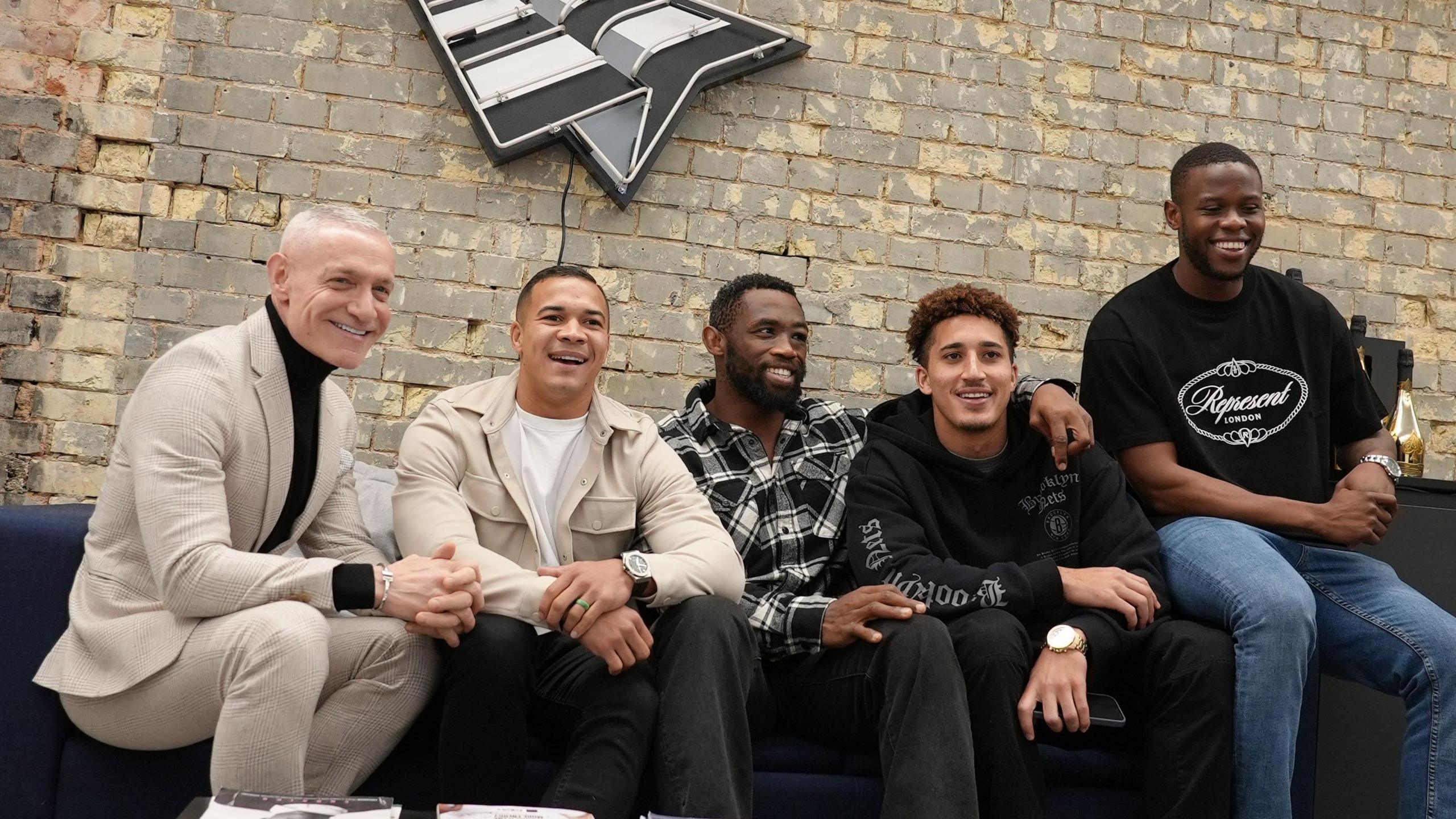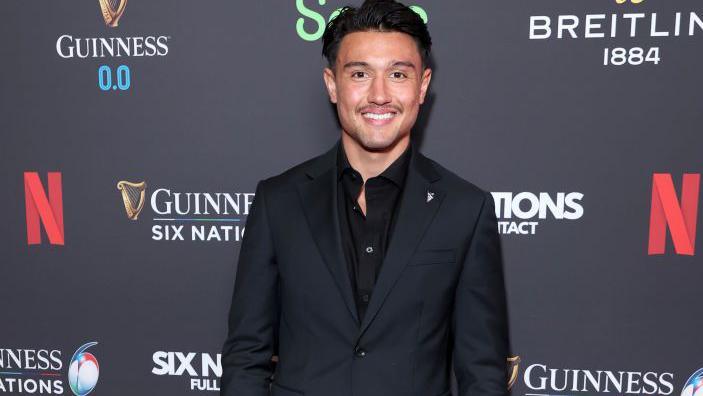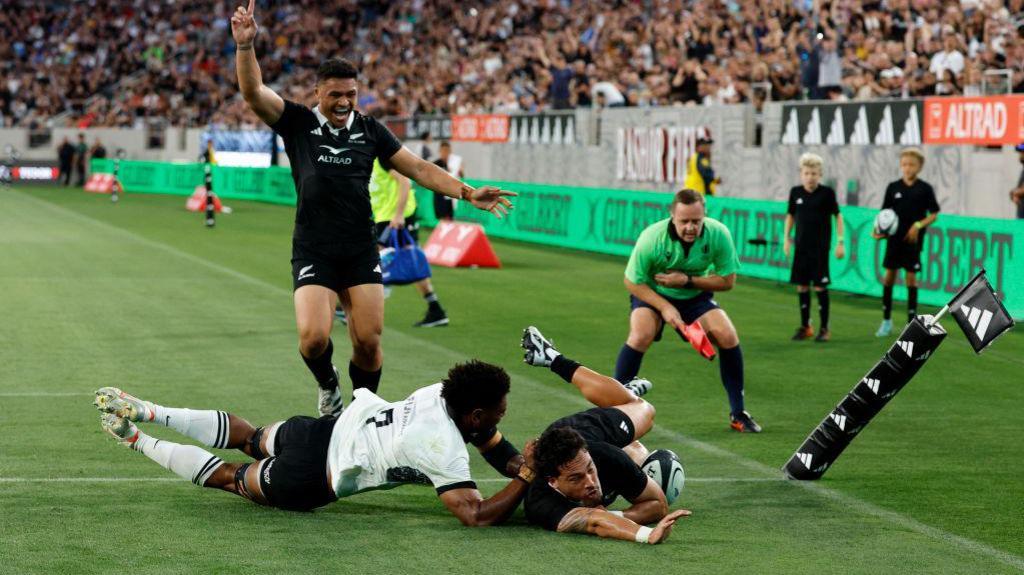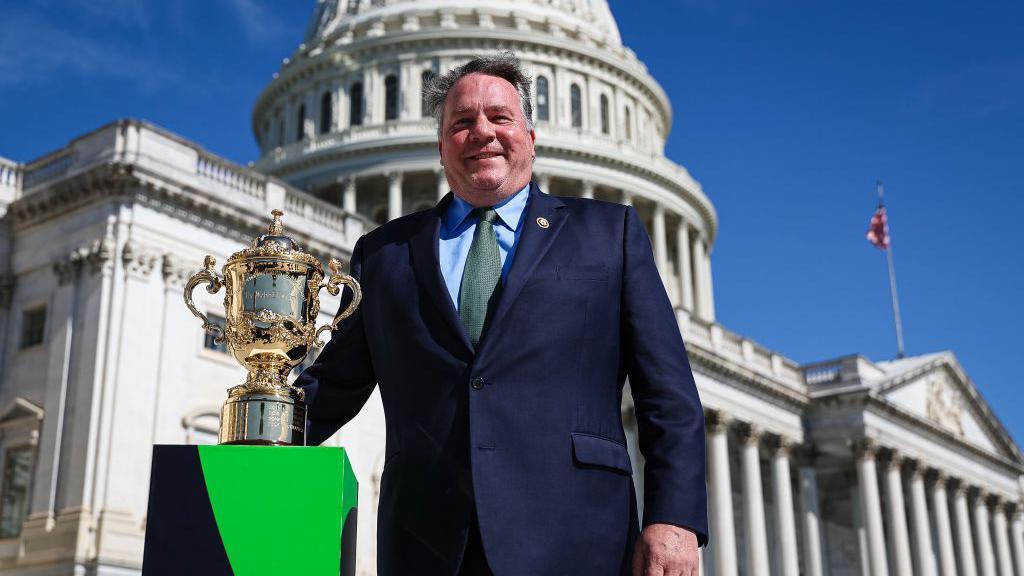'To break America, rugby must learn to love its stars'

Michael Yormark, far left, with Roc Nation clients and South Africa internationals Cheslin Kolbe, Siya Kolisi, Jordan Hendrikse and Aphelele Fassi
- Published
Rugby must learn to love its stars if an unprecedented push to break the United States is to succeed, according to the agents who represent some of the sport's biggest names and America's most influential entertainment figures.
Roc Nation, which has Rihanna and Alicia Keys among the music stars on its roster, expanded into sport in 2013 and rugby specifically in 2019.
The agency now represents South Africa's two-time Rugby World Cup-winning captain Siya Kolisi, his Springboks team-mate Cheslin Kolbe, former world player of the year Ardie Savea and England trio Marcus Smith, Ellis Genge and Maro Itoje.
"There are so many traditionalists still in the game that want to do things in the traditional way," said Michael Yormark, president of Roc Nation Sports International.
"But many people are beginning to understand that if rugby is truly going to be a global sport, if it is going to be truly commercially viable, if it's going to break through in America - then things need to be done differently.
"Why are the NBA and NFL so popular? Star power. Rugby needs to learn from those examples - it doesn't need to be exactly the same, but it needs to understand what is important, especially when you go to America.
"Look at Major League Soccer. Nobody talked about the MLS until [Argentine superstar Lionel] Messi went there. Star power sells, it is critical, and we need to develop stars in rugby and in America for the game to be elevated."

England fly-half Marcus Smith was one of the stars of the first season of Netflix documentary series Full Contact
Rugby union was first played in the United States 150 years ago, and the country won Olympic golds in the 15-a-side game at the 1920 and 1924 Olympics, however it has remained a niche interest with about 780,000 stateside players according to World Rugby.
The global governing body hopes to boost interest in the United States over the next decade with the sevens tournament at the Los Angeles Olympics in 2028 leading into the men's and women's Rugby World Cups in the United States in 2031 and 2033 respectively.
Test matches are being strategically staged, with England set to play the United States as part of this year's summer tour and New Zealand and Ireland reportedly meeting in Chicago, external in autumn 2025.

New Zealand beat Fiji 47-5 in a Test staged in front of more than 33,000 fans in San Diego in July
The 2030 finale of the new biennial Nations Championship, which will launch in 2026 and feature the best Test teams in the world, could also be staged in the United States as part of the "runway" to the Rugby World Cups.
World Rugby estimates that capturing just 1% of the US sports rights market would double rugby union's revenues globally.
Yormark warns that even that modest target will be hard to hit.
"The USA is so cluttered with sports it is very difficult to break through," he added.
"Rugby has a lot of potential in the American market, the physicality of the sport is similar to the NFL, there are so many great athletes and great entertainers among the top players.
"Major League Rugby has done a great job. It is in 12 markets and the attendance is increasing - it is becoming more and more relevant every season.
"I think it is doable for rugby - there are six or seven years to really plant the seeds. It really needs to create an identity and a story in order to break through. There is no quick fix, but I think they have the opportunity to do it."

Twenty-seven potential host cities for Rugby World Cups 2031 and 2033 attended a summit in Washington in July before the United States' men's team played Scotland in the city
When it first opened its London office in 2019, Roc Nation Sports International had no intention of moving into rugby.
However, intrigued by the commotion around England's run in the tournament, a curious Yormark watched that year's Rugby World Cup final in the back of an executive car on the way north to meet Manchester City midfielder and Roc Nation client Kevin de Bruyne.
Yormark heard a victorious Kolisi speak about the relationship between South Africa and the Springboks. He read about Kolisi's township upbringing, when the future flanker's favourite toy was a brick. He was convinced. A few weeks later, Kolisi had signed with Roc Nation.
Roc Nation uses star power from other parts of their business to shine a light on such stories: Kolisi has hung out with NBA legend Kevin Durant, while Itoje has spent time with superstar producer DJ Khaled at his Miami home.
Convincing rugby's stars to promote themselves as aggressively as artists in other arenas, though, has proved a challenge.
It often falls to Paul Adesoye. Roc Nation's head of rugby has to overcome an ingrained culture that prioritises the dressing-room collective above individual empire building, even if the example of United States sevens player and social media superstar Ilona Maher has changed perspectives.
"Over here the guys are a little bit more reticent about doing it," said Adesoye. "To be honest, they are a bit nervous about the reaction of their team-mates and their clubs as well. But it is slowly changing.
"Danny Care has launched a vlog and done a podcast - granted he is towards the end of his career, but it is becoming more common in the sport.
"I think it will eventually go in the direction of how it has in the United States where you have current NBA players doing podcasts during the season, telling their story first-hand. It is a matter of time."
Whether it will be in time for rugby's big push west, though, is the question.